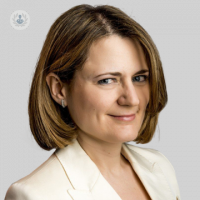How are developmental delays in children diagnosed?
Escrito por:Developmental and growth delays or issues in infants and toddlers can cause quite the concern for parents, and can greatly affect a child’s behaviour as well as how they deal with their emotions as they progress into adulthood.
Here to explain how infant and toddler developmental problems can be diagnosed is esteemed consultant paediatrician and neonatologist, Dr Olga Kapellou. In our latest article, the revered paediatric specialist also tells us how a child can reach their full potential despite suffering from a developmental disorder.

How are developmental issues in infants and toddlers typically diagnosed?
Infancy and early years of life are periods of quite rapid growth and development. Noticing that a child might not be developing at what is deemed a normal rate of development and growth is crucial when it comes to diagnosing developmental issues in children.
Thorough examinations will need to be carried out in order to fully understand why the child is not developing as he or she typically should. A detailed assessment of growth parameters is a crucial part of the examination of a paediatric patient. Deviations from growth trajectories combined with a full history and examination, provide the clues that are required for diagnosis.
How are growth measurements of infants and toddlers carried out?
Regulation of growth is, of course, quite complex and multifactorial. Growth measurements of an individual child are plotted on growth percentile charts to identify patterns over time. Interpreting these various different growth measurements is hugely important and should take the child’s complete medical history and clinical examination into consideration.
As a typical rate of infant and toddler growth and development is a reflection of overall health and nutritional status, recognising an inconsistency or an irregularity in the child’s behaviour is crucial.
Noticing the child’s interaction with his or her immediate surroundings should also be examined closely and, in order for an effective growth measurement of the child to be carried out efficiently, all of the abovementioned factors should be combined with a full history of parental health, pregnancy and delivery history, which all provide extremely valuable insights.
Who falls into the high-risk category?
High-risk children include pre-term babies, low-birth weight babies and babies who required intensive care due to serious health complications.
How can a child’s full potential be reached?
A continuous and rigorous monitoring of the infant or toddler’s growth and development as well as working with the multidisciplinary team members in order to effectively manage any challenges encountered, ensures children reach their full potential.
Dr Olga Kapellou is a highly revered and experienced London-based consultant paediatrician and neonatologist who specialises in infant and toddler neurodevelopmental examinations. If you are worried about the overall growth and development of your child, you may wish to consult directly with Dr Kapellou by visiting her Top Doctors profile today.


